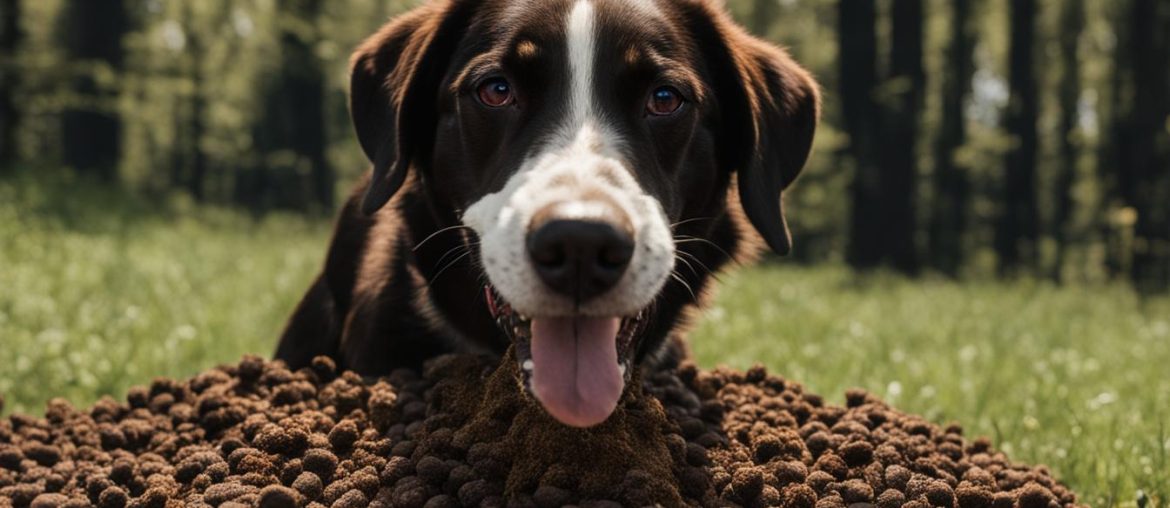Dogs eating poop is a perplexing behavior that many dog owners find repulsive. The scientific term for this behavior is coprophagia. While the exact reasons behind this behavior are not fully understood, there are several behavioral and physiological factors that contribute to dogs eating poop.
According to a study conducted at the University of California, Davis, 16% of dogs are classified as “serious” poop eaters, and 24% of dogs have been observed eating poop at least once. This behavior is believed to be a reflection of an ancestral instinct to protect pack members from parasites present in feces.
From personal experience, I would say that eating poop is normal for dogs and puppies to some extent, but there are ways to discourage this behavior through behavior modification and the use of certain products.
Key Takeaways:
- Dogs eating poop, known as coprophagia, is a common behavior.
- 16% of dogs are classified as “serious” poop eaters.
- 24% of dogs have been observed eating poop at least once.
- This behavior is believed to be an ancestral instinct to protect pack members.
- There are ways to discourage this behavior through behavior modification and product use.
The Normalcy of Dogs Eating Poop
It may come as a surprise to some dog owners, but dogs eating poop is actually considered normal behavior in certain situations. Canine mothers, for example, will often lick their puppies to stimulate them to eliminate, and they may also clean up their puppies’ poop by eating it. This behavior is rooted in their natural instincts to keep the den clean and protect against potential predators. Puppies themselves may also engage in this behavior, consuming their own poop as well as the poop of other dogs and animals. While it is generally safe for puppies to eat their own poop, caution should be exercised if they consume feces from other animals that may be contaminated with parasites, viruses, or toxins.
According to Dr. Stanley Coren, Ph.D., a renowned expert in canine behavior, this behavior typically diminishes as the puppy grows and reaches around nine months of age. The puppy’s instinct to investigate and consume poop gradually gives way to more mature behaviors.
While it may seem unappetizing and puzzling to humans, this behavior is a normal part of a dog’s developmental process. Understanding the reasons behind it can help dog owners make informed decisions and take appropriate steps to discourage and manage this behavior.
“Dogs eating poop is considered normal behavior in certain situations. This behavior is rooted in their natural instincts to keep the den clean and protect against potential predators.”
To provide a visual demonstration of the normalcy of dogs eating poop, below is a table summarizing the situations in which this behavior is typically observed:
| Situation | Description |
|---|---|
| Mother Dogs and Puppies | Mother dogs may eat their puppies’ poop to keep the den clean and protect against predators. Puppies may also engage in this behavior while exploring their environment. |
| Puppies | Puppies may eat their own poop as part of their natural curiosity and exploration. This behavior typically diminishes as they grow older. |
While poop-eating may be considered normal in certain situations, it is essential for dog owners to be aware of the potential health risks associated with this behavior. In the next section, we will explore the reasons why dogs eat poop and the potential consequences it may have on their well-being.
Reasons Behind Dogs Eating Poop
There are several reasons why dogs engage in the behavior of eating poop, also known as coprophagia. Understanding these reasons can help dog owners address the behavior and take appropriate measures to prevent it. Some of the main reasons behind this behavior include genetic factors, nutritional deficiencies, underlying health conditions, and environmental factors such as stress and boredom.
Genetic factors play a role in a dog’s inclination to eat poop. Dogs are descendants of scavengers, and their ancestors had to rely on whatever food sources they could find, including feces. This instinct has been passed down through generations, making some dogs more likely to engage in coprophagia.
Nutritional deficiencies can also contribute to this behavior, although it is less common in dogs that are fed a balanced commercial diet. If a dog is not receiving all the necessary nutrients from its food, it may try to supplement its diet by eating poop.
Underlying health conditions can also play a role in a dog’s poop-eating behavior. Medical issues such as thyroid disease or diabetes can disrupt a dog’s normal eating patterns and lead to coprophagia. It is important to consult a veterinarian to rule out any underlying health issues if a dog is consistently eating poop.
Environmental factors, such as stress, anxiety, and boredom, can trigger a dog to eat poop. Dogs may engage in this behavior as a way to relieve stress or boredom, or as a form of attention-seeking behavior. Providing a stimulating environment, regular exercise, and mental enrichment can help reduce the likelihood of a dog resorting to coprophagia.
Table: Common Reasons behind Dogs Eating Poop
| Reasons | Description |
|---|---|
| Genetic Factors | Dogs have inherited an instinct to scavenge and eat whatever they find, including poop. |
| Nutritional Deficiencies | If a dog is not receiving all the necessary nutrients from its food, it may seek to supplement its diet by consuming poop. |
| Underlying Health Conditions | Medical issues such as thyroid disease or diabetes can disrupt a dog’s normal eating patterns and lead to coprophagia. |
| Environmental Factors | Stress, anxiety, and boredom can trigger a dog to eat poop as a way to relieve stress or seek attention. |
Understanding the reasons behind a dog’s poop-eating behavior is the first step in addressing it. By addressing any underlying health issues, providing a balanced diet, and creating a stimulating environment, dog owners can help discourage their pets from engaging in coprophagia.
Health Risks of Dogs Eating Poop
When it comes to dogs eating poop, there are significant health risks involved. This behavior can expose dogs to various diseases and parasites that can have serious consequences for their well-being. Consuming poop can lead to infections caused by parasitic worms such as roundworms, hookworms, and whipworms. These worms can cause a range of symptoms, including diarrhea, weight loss, and nutritional deficiencies.
In addition to worms, dogs that eat poop can also contract other pathogens like Giardia and Salmonella. These pathogens can cause severe gastrointestinal distress and can be particularly dangerous for puppies, older dogs, or dogs with weakened immune systems. Furthermore, if a dog ingests poop from a dog on medication, they run the risk of absorbing undigested medications, potentially leading to toxicity.
I recommend to note that the health risks associated with dogs eating poop are not limited to the dogs themselves. If a dog that eats poop licks their owners or comes into contact with their hands or face, there is a risk of transmission to humans. This can lead to a range of illnesses, including bacterial infections and parasites.
| Health Risks of Dogs Eating Poop | Effects on Dogs | Effects on Humans |
|---|---|---|
| Contracting parasitic worms (roundworms, hookworms, whipworms) | Diarrhea, weight loss, nutritional deficiencies | Bacterial infections, parasitic infections |
| Contracting pathogens (Giardia, Salmonella) | Gastrointestinal distress, dehydration | Bacterial infections, gastrointestinal illnesses |
| Exposure to undigested medications | Medication toxicity | Potential for medication absorption |
To mitigate these health risks, it is crucial to consult a veterinarian if your dog consistently exhibits poop-eating behavior. The vet can provide appropriate testing and medical treatment if necessary. Additionally, it’s important to take steps to discourage this behavior, such as keeping the environment clean, providing a balanced diet, and using taste-aversion products if recommended by a veterinarian.
Environmental and Behavioral Factors
Environmental and behavioral factors play a significant role in a dog’s propensity to eat poop. Dogs that are kept alone or in restrictive confinement, such as kennels or basements, are more likely to engage in coprophagia. The lack of mental and physical stimulation can lead to boredom and the development of undesirable behaviors, including poop eating. Additionally, dogs that experience anxiety or have been subjected to punishment or harsh training methods may turn to poop eating as a coping mechanism.
One environmental factor that can contribute to poop eating is the association between the scent of food and feces. If a dog is fed near their potty area or has been exposed to their mother’s breath after she has cleaned them, they may develop an association between the two smells. This can lead to a dog mistaking the scent of poop for food and consuming it. Therefore, it is crucial to feed dogs in separate areas away from their potty areas.
To prevent poop eating, it is essential to provide a stress-free and stimulating environment for dogs. Regular exercise, both physical and mental, helps to reduce boredom and anxiety, decreasing the likelihood of engaging in undesirable behaviors. Ensuring that dogs have access to toys, puzzles, and interactive playtime can also redirect their focus and prevent them from turning to poop eating as a source of entertainment.
The Role of Training and Reinforcement
Behavioral training plays a crucial role in addressing poop-eating behavior. Positive reinforcement techniques can be used to reward dogs for desirable behaviors and discourage undesirable behaviors such as poop eating. When a dog avoids eating poop, they should be praised and rewarded with treats or verbal praise. Consistency is key, and it is important to remain patient throughout the training process.
Using a head collar during walks can provide owners with greater control over their dogs and help prevent access to poop. This can be particularly useful in areas where poop is frequently encountered, such as public parks. Leash control allows owners to redirect their dogs’ attention away from the poop and guide them towards more appropriate behavior.
Overall, creating an environment that is enriched and free from stress, combined with positive reinforcement training techniques, can help deter dogs from eating poop. It is essential to address this behavior as soon as it is observed to minimize the associated health risks and promote a healthier and happier life for our canine companions.
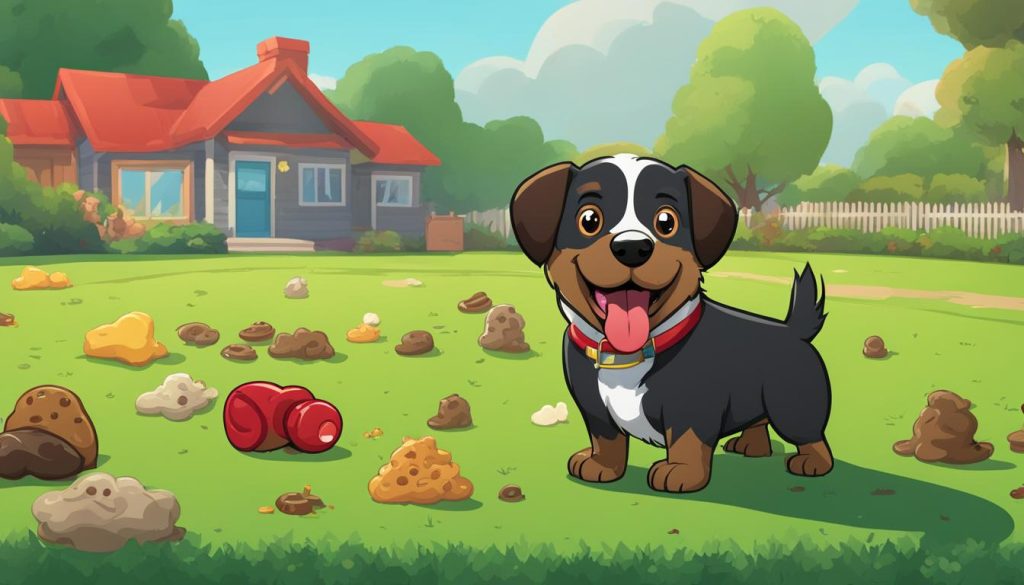
| Environmental Factors | Behavioral Factors |
|---|---|
| Restrictive confinement | Anxiety |
| Lack of mental and physical stimulation | Punishment or harsh training methods |
| Association between scent of food and feces |
Diagnosing and Addressing Health Issues
When a dog starts to eat poop, it is crucial to consult a veterinarian to identify and address any underlying health issues. There are various medical conditions that can contribute to this behavior, including parasites, nutritional deficiencies, malabsorption syndromes, and hormonal imbalances. By conducting specific tests, the vet can determine the root cause and recommend appropriate treatment.
Addressing the underlying health issues is essential in resolving the poop-eating behavior. For example, if the dog has a parasite infestation, the vet may prescribe deworming medication to eliminate the parasites. Similarly, if the dog is experiencing a nutritional deficiency, the vet may suggest dietary adjustments or supplements to ensure the dog is receiving all the necessary nutrients.
From personal experience, I would say that resolving the underlying health issues may take time, and it is essential to follow the veterinarian’s guidance throughout the process. In some cases, the poop-eating behavior may persist even after the health issues have been addressed. In such situations, additional behavioral and environmental modifications may be necessary to discourage the behavior and provide the dog with alternative outlets for their natural instincts and behaviors.
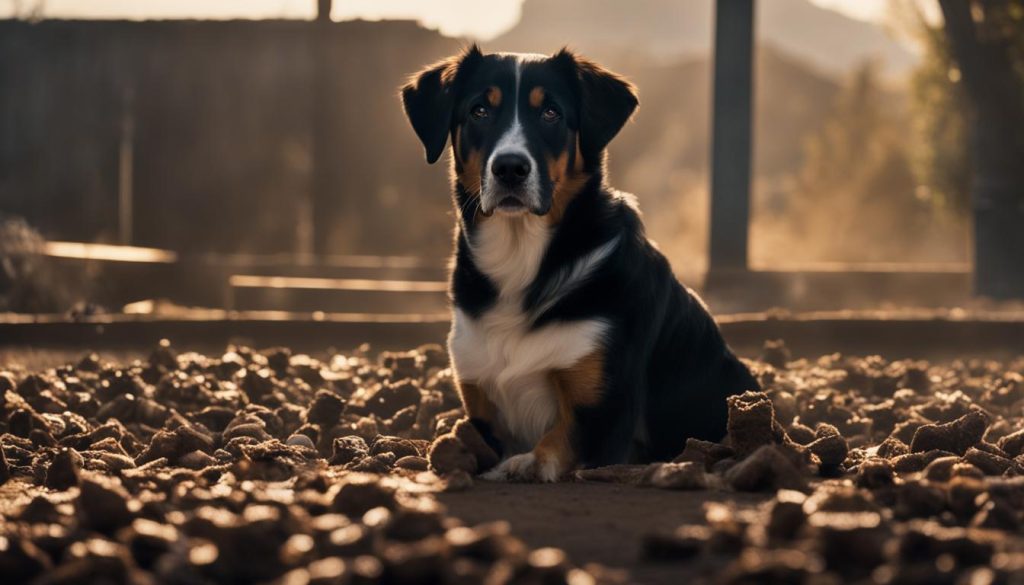
Overall, diagnosing and addressing health issues is an important step in managing and preventing dogs from eating poop. Consultation with a veterinarian is crucial to ensure the dog’s health and well-being, as well as to minimize the potential health risks associated with poop eating. By taking a holistic approach that addresses both medical and behavioral factors, dog owners can help their pets overcome this behavior and provide them with a healthier and more fulfilling life.
Discouraging Poop-Eating Behavior
Discouraging a dog from eating poop requires a combination of approaches to address the underlying causes and modify their behavior. Here are some effective strategies:
1. Modify the Diet:
Ensuring that your dog is receiving a balanced diet can help reduce the likelihood of poop eating. Consult with your veterinarian to evaluate your dog’s nutritional needs and consider adding supplements or enzyme supplementation to aid in digestion and nutrient absorption.
2. Use Taste-Aversion Products:
Taste-aversion products can make poop less palatable to dogs, deterring them from consuming it. These products are applied directly onto the poop and make it taste unpleasant without causing harm to the dog.
3. Behavioral Training:
Training your dog to obey commands, such as “leave it” or “drop it,” can help deter them from eating poop. Consistent and positive reinforcement training methods can help redirect their focus and replace the behavior with a more desirable alternative.
4. Environmental Management:
Creating a stress-free and stimulating environment for your dog is crucial in preventing poop eating. Provide regular exercise and mental stimulation to alleviate boredom and anxiety. Avoid feeding your dog near their potty area and ensure proper waste cleanup to eliminate access to poop.
| Method | Description | Effectiveness |
|---|---|---|
| Modify the Diet | Ensure a balanced diet with necessary supplements. | Effective in reducing the likelihood of poop eating. |
| Use Taste-Aversion Products | Make poop less palatable to dogs. | Can be effective in deterring poop-eating behavior. |
| Behavioral Training | Teach “leave it” or “drop it” commands. | Effective with consistent and positive reinforcement. |
| Environmental Management | Create a stress-free and stimulating environment. | Crucial in preventing access to poop and reducing the behavior. |
Implementing a combination of these strategies tailored to your dog’s needs can help discourage the poop-eating behavior. It is important to remain patient and consistent in your approach, seeking guidance from a professional dog trainer or veterinarian if needed. Remember, every dog is unique, and it may take time to see significant improvements.
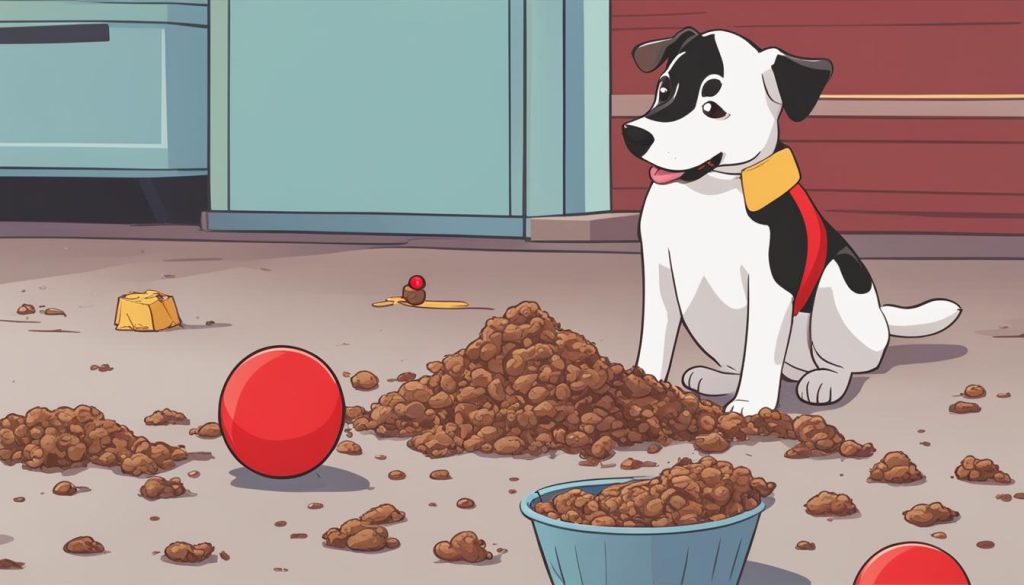
Managing the Environment to Prevent Poop Eating
Managing the dog’s environment is crucial in preventing poop eating. By taking a few simple measures, dog owners can significantly reduce the chances of their furry friends engaging in this behavior. First and foremost, it is important to promptly clean up any poop in the yard or during walks to eliminate the opportunity for the dog to consume it. This not only prevents the dog from forming the habit but also helps maintain a clean and hygienic environment for both the dog and the owner.
When taking the dog for a walk, it is advisable to keep them on a leash to have better control and prevent access to poop. This allows the owner to supervise the dog and redirect their attention if they show any interest in consuming poop. For households with multiple dogs, it is essential to ensure that all dogs are on a stool-eating deterrent to make their poop unpalatable. This can be achieved through the use of commercial products specifically designed to discourage poop eating.
| Methods to Prevent Poop Eating | Effectiveness |
|---|---|
| Regularly clean up poop | Highly effective |
| Keep the dog on a leash during walks | Highly effective |
| Use stool-eating deterrent products | Moderately effective |
Providing a clean and stimulating environment for the dog is also crucial in preventing poop eating. Regular exercise and mental stimulation, such as puzzle toys and interactive play, can help alleviate boredom and reduce the likelihood of engaging in undesirable behaviors, including coprophagia. Additionally, ensuring the dog’s diet is nutritionally balanced and meeting their specific needs can also help deter poop eating behavior.
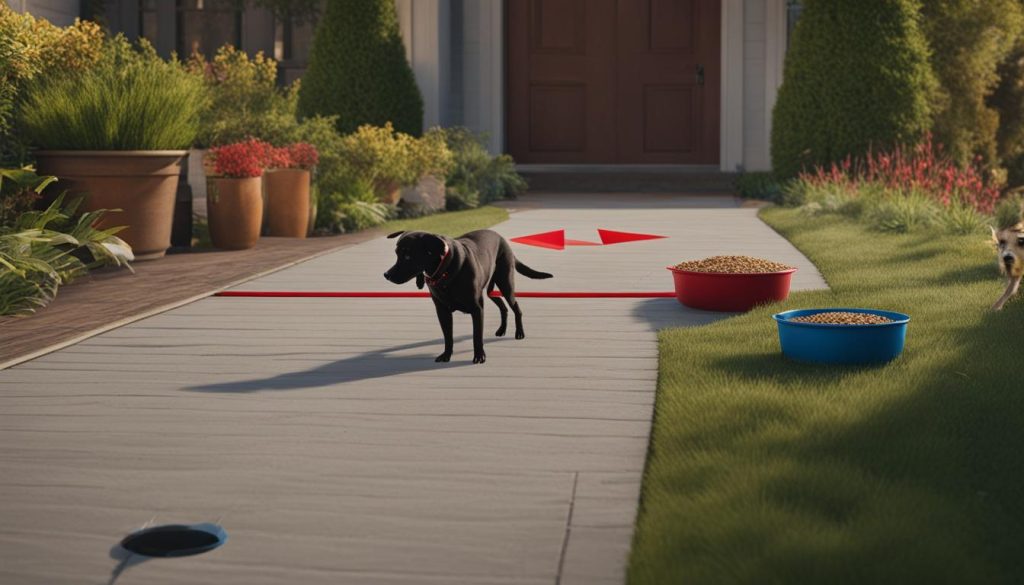
By managing the dog’s environment effectively, dog owners can create a safe and poop-free environment for their furry friends. Consistency, supervision, and proper care are key to addressing and preventing poop eating behavior.
Final Thoughts
After exploring why dogs eat poop and the associated health risks, it is clear that this behavior is relatively common in dogs. While it may be repulsive to humans, it is important to understand that dogs have a natural instinct to engage in this behavior. However, there are steps that can be taken to discourage poop eating and minimize the potential health risks.
If you notice your dog consistently eating poop, it is crucial to consult a veterinarian to rule out any underlying health issues. By addressing any medical conditions or nutritional deficiencies, you can help resolve the behavior. Additionally, providing a balanced diet, proper training, and a stimulating environment can go a long way in deterring your dog from engaging in this behavior.
Remember, the health risks associated with dogs eating poop include the transmission of parasites and pathogens. Promptly cleaning up after your dog and managing their environment can prevent access to poop and reduce the chances of them consuming it. By taking these measures, you can ensure the overall well-being of your beloved pet and help them lead a healthier, poop-free life.
FAQ
Is it normal for dogs to eat poop?
Yes, to some extent. Dogs are descended from scavengers and have an ancestral instinct to eat whatever they find on the ground or in the trash. However, consistently eating poop can indicate underlying issues.
Why do dogs eat poop?
There are several reasons why dogs eat poop, including genetic factors, nutritional deficiencies (though this is rare in dogs fed a balanced diet), underlying medical conditions, and environmental factors such as stress, anxiety, and boredom.
What are the health risks of dogs eating poop?
Dogs that eat poop are at risk of contracting diseases and parasites, including parasitic worms like roundworms, hookworms, and whipworms, as well as other pathogens like Giardia and Salmonella. There is also a risk of transmission to humans if a dog that eats poop licks their owners or comes into contact with their hands or face.
How can I stop my dog from eating poop?
To discourage this behavior, you can consult a veterinarian to rule out any underlying health issues, provide a balanced diet and supplementation if necessary, use taste-aversion products to make poop less appetizing, and implement behavioral and environmental management techniques like leash control and regular exercise.
What should I do if my dog consistently eats poop?
It is important to consult a veterinarian to determine if there are any underlying health issues contributing to this behavior. The vet may recommend specific tests and treatments to address the root cause.
How can I prevent my dog from eating poop in the future?
Managing the dog’s environment is crucial. Clean up poop promptly, keep your dog on a leash during walks, and supervise them in the yard. For households with multiple dogs, ensure that all dogs are on a stool-eating deterrent. Providing a stress-free and stimulating environment can also help reduce the likelihood of poop eating.
Can dogs eat their own poop?
It is generally safe for dogs to eat their own poop, although it is not ideal. However, there are risks if they consume poop from other animals that may be contaminated with parasites, viruses, or toxins.


